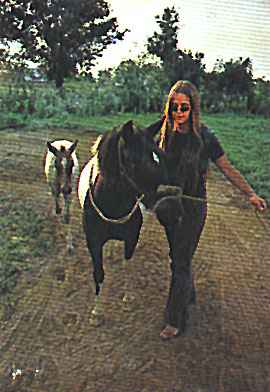 |
She completely mastered the idioms of rock and roll, rhythm 'n blues, gospel, urban blues, contemporary folk music and country, integrating them to create a gestalt that would both precede (in 1971) and exceed the efforts of numerous artists to follow the West Coast rock to Tennessee country trip. And, working more extensively in the blues, Tracy Nelson continues to make noteworthy records with artists such as Al Kooper. Yet, her work goes virtually unheard -- if that's an exaggeration, it is only a slight one. Her relative obscurity reflects the contrary nature of the music industry; certainly it proves that there's "more than meets the ear" when it comes to creating markets for music. But, like Britain's Sandy Denny, who never achieved deserving fame in folk, rock, or in country-flavored rock, Tracy Nelson remained a "critic's choice" -- always surrounded by crack musicians yet neglected by a mass audience. |
|||
|
Always ahead of her time, that's Tracy Nelson, the little girl with the booming voice. Take the theme song from the film "Revolution" (where, by the way, is the film's star, Today Malone, More characteristic is Tracy's other vocal on the soundtrack, "Without Love." It's basically a southern gospel number. Tracy's backed by an expansive chorus. The mixing isn't great, and Tracy's power is just hinted at in this early recording. Still, the feel of the song will come through in later recordings. That power certainly equals anything ever applied to a blues or gospel-based song. This was an era of excess, however, not an era of taste; what singer could compare to the flamboyance of Janis Joplin, regardless of vocal ability? So, it was Janis who became the center of attention and whose records continue to sell. Most of Joplin's fans, and quite a few fans of contemporary blues-singing women, for example, Rory Block, Indigo Girls, Bonnie Raitt, Melissa Etheridge, are really missing the whole show. For it was Tracy Nelson who succeeded in putting blues back into country, taking a California sound and creating a kind of contemporary folk sound with depth enough to endure through decades of play. Retreat Bands in the 1960s followed a "pattern" of development perhaps best illustrated in the album, "Music from Big Pink," by The Band. They gathered their energies in a kind of "residency program." The Mamas and the Papas built their sound in the Bahamas; when Sandy Denny arrived, Fairport Convention put their sound together in an English country cottage. Mother Earth, which originated in Texas, went into "retreat" as the Haight-Ashbury era came to a screeching halt. They high-tailed it to the Tennessee hills, using the name of the Wautauga Cumberland Settlers Association as they prepared to release two landmark albums that marked stunning growth. The musical "environment" benefitted a great deal from the addition of guitarist Jack Lee. It was one of those combinations of male songwriter/female singer that critics probably make too much of; nevertheless, there was a new magic in the band. R. Powell St. John, vocalist/harmonica player/songwriter, an important 60s musician in his own right, departed. Lee's style melded beautifully with Nelson's, as well as the rest of the band, which were always a step ahead of the likes of Big Brother & The Holding Company. Why this band never emerged as a leading economic as well as critical force is almost incomprehensible. |
||||
The move was defined in "Going Back to Tennessee," penned by guitarist Jack Lee: California was crazy, made me so tired and lazy, I want to feel free and easy, I'm goin' back to Tennessee Mother Earth is one band that certainly did "tune in, turn on and drop out" -- out of the San Francisco hippie scene, that is! Jack Lee |
|
|||
|
This rousing, driving rock song, compared with "Tennessee Blues," a country song from "Tracy Nelson and Mother Earth" by band favorite songwriter Bobby Charles, which absolutely suited the depth and range of Nelson's voice, as well as her ability to use dynamics, could pretty much define this new approach. It's the sophistication of the latter If I had my way, I'd leave here today, I'd leave in a hurrryyyyy with Nelson's voice lingering and purring over the last two syllables in a display of control and sophistication not heard from again until, perhaps, Emmylou Harris first cooed "Wrecking Ball" for PBS audiences just a year ago. The best songs on these two landmark albums are neither country songs nor rockers. They're something the band seems to have invented, somehow, borrowing the talents of songwriters like John Hiatt "Precious Memories of You", Charles "Stayin' Home and Singing Homemade Songs" and Eric Kaz "Mother Earth Provides For Me", "Someday My Love May Grow" and D. Buskin, "When I Need You Most of All." These were written when the concept of a contemporary folk song was a new idea. They're somewhat sophisticated; you can't imagine, really, anyone singing these songs but Tracy Nelson. They require a kind of "quiet power" that she seems to blend better than anyone. The gospel influence comes through most strongly in Lee's "Poor Man's Paradise." That song, too, marks a maturity of the band's highly individual San Francisco sound: The horns are omnipresent, there's a gospel quality and the chorus is almost mantra-like. These are all songs you don't expect from the time period; play them -- if you can find them -- at a party and no one will think they are anything but new.
|
||||
